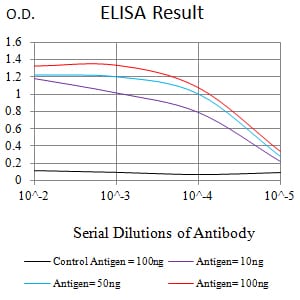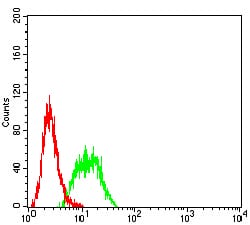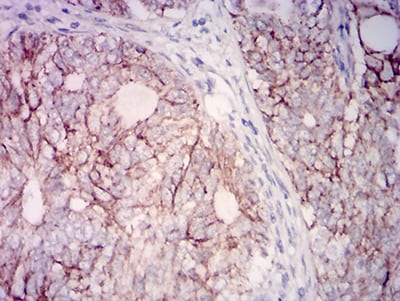


| WB | 咨询技术 | Human,Mouse,Rat |
| IF | 咨询技术 | Human,Mouse,Rat |
| IHC | 1/200 - 1/1000 | Human,Mouse,Rat |
| ICC | 技术咨询 | Human,Mouse,Rat |
| FCM | 1/200 - 1/400 | Human,Mouse,Rat |
| Elisa | 1/10000 | Human,Mouse,Rat |
| Aliases | PTGFRN; FPRP; EWI-F; CD9P-1; SMAP-6 |
| Entrez GeneID | 5738 |
| clone | 4E9G7 |
| WB Predicted band size | 98.6kDa |
| Host/Isotype | Mouse IgG2b |
| Antibody Type | Primary antibody |
| Storage | Store at 4°C short term. Aliquot and store at -20°C long term. Avoid freeze/thaw cycles. |
| Species Reactivity | Human |
| Immunogen | Purified recombinant fragment of human CD315 (AA: extra 46-221) expressed in E. Coli. |
| Formulation | Purified antibody in PBS with 0.05% sodium azide |
+ +
以下是关于CD315抗体的参考文献示例(注:CD315可能指CLEC12A,以下内容为示例性概括):
1. **"CLEC12A as a Therapeutic Target in Acute Myeloid Leukemia"**
*Authors: van Rhenen A, et al.*
**摘要**:本研究探讨了CLEC12A(CD315)在急性髓系白血病(AML)细胞表面的高表达特性,并开发了一种靶向CLEC12A的单克隆抗体。实验表明,该抗体通过抗体依赖性细胞毒性(ADCC)显著抑制AML细胞生长,提示其作为免疫治疗靶点的潜力。
2. **"Structural Characterization of CLEC12A and Epitope Mapping of Anti-CD315 Antibodies"**
*Authors: Lötscher B, et al.*
**摘要**:通过X射线晶体学解析了CLEC12A的胞外结构域,并鉴定了靶向CD315的单克隆抗体的结合表位。研究为抗体药物的优化设计提供了结构基础。
3. **"Anti-CD315 Antibody-Drug Conjugate in Solid Tumors: Preclinical Evaluation"**
*Authors: Jones RK, et al.*
**摘要**:开发了一种靶向CD315的抗体-药物偶联物(ADC),在实体瘤模型中显示出显著抗肿瘤活性。摘要强调该ADC通过靶向递送细胞毒性药物,减少对正常组织的影响。
4. **"CD315 Expression Correlates with Poor Prognosis in Ovarian Cancer"**
*Authors: Zhang Y, et al.*
**摘要**:分析了CD315在卵巢癌组织中的表达,发现其高表达与患者生存率降低相关。研究验证了抗CD315抗体的诊断价值,并探索了其用于靶向治疗的可行性。
**提示**:以上为示例文献,实际文献需通过PubMed、Google Scholar等平台检索关键词(如CLEC12A、CD315 antibody、leukemia target等)获取。建议结合具体研究领域细化搜索。
CD315. also known as TIM-3 (T cell immunoglobulin and mucin domain-containing protein 3), is an immune checkpoint molecule first identified in 2002. It is a type I transmembrane protein expressed on immune cells, including T cells, natural killer (NK) cells, and dendritic cells. Structurally, it contains an immunoglobulin variable domain, a mucin-like domain, and a cytoplasmic tail with tyrosine phosphorylation sites. TIM-3 plays a dual role in immune regulation: it modulates T cell exhaustion in chronic infections and cancer while also contributing to immune tolerance and homeostasis.
In cancer, TIM-3 is often co-expressed with PD-1 on dysfunctional "exhausted" T cells, making it a key target for immunotherapy. Antibodies targeting CD315 aim to block its interaction with ligands like galectin-9. phosphatidylserine, or CEACAM-1. thereby reversing T cell suppression and restoring anti-tumor immunity. Preclinical studies show that anti-CD315 antibodies enhance T cell activation and synergize with anti-PD-1 therapies.
Several anti-TIM-3 antibodies (e.g., cobolimab, MBG453/sabatolimab) are in clinical trials for solid tumors and hematologic malignancies. Challenges include optimizing dosing, managing immune-related adverse events, and identifying predictive biomarkers. Research continues to explore its role in autoimmune diseases, viral infections, and combination therapies. As a next-gen checkpoint inhibitor, CD315 antibodies hold promise for overcoming resistance to existing immunotherapies.
×